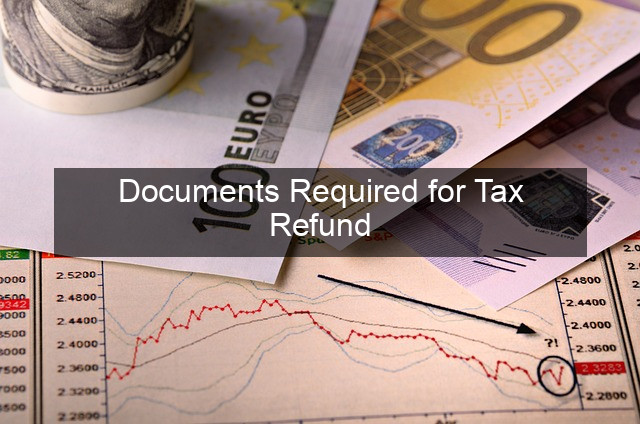Documents Required for Tax Refund

- Documents Required for Tax Refund
- Navigating the Tax Refund Maze: Documents You'll Need
- Essential Documents for Everyone
- W-2 Forms: Your Earnings Summary
- 1099 Forms: Income from Other Sources
- Form 1040: The Main Tax Return Form
- Documents for Specific Deductions and Credits
- Itemized Deductions: Supporting Your Claims
- Education Credits: Proof of Expenses
- Additional Documents for Special Circumstances
- Self-Employment Income: Tracking Your Earnings and Expenses
- Rental Property Income: Documenting Income and Expenses
- Organizing Your Tax Documents
- Creating a System for Success
- Utilizing Digital Tools for Efficiency
- Conclusion: Preparing for a Smooth Tax Season
- Frequently Asked Questions (FAQs)

Navigating the Tax Refund Maze: Documents You’ll Need
Tax season can be a daunting time, filled with forms, deadlines, and the ever-present fear of making a mistake. But amidst the complexity lies the potential for a welcome reward: a tax refund. While the prospect of receiving money back from the government is exciting, the process of claiming it can feel overwhelming. One of the most crucial aspects of a successful tax refund claim is ensuring you have all the necessary documentation. Missing a vital document can delay your refund or even lead to its rejection. This comprehensive guide will walk you through the essential documents required for a smooth and successful tax refund process, helping you navigate the complexities and maximize your return. Understanding the specific documents needed for your individual situation is key to avoiding unnecessary delays and frustrations. So, let’s dive in and demystify the document requirements for your tax refund.
Essential Documents for Everyone
W-2 Forms: Your Earnings Summary
The W-2 form is a cornerstone of your tax return. Provided by your employer, it details your annual earnings and the taxes withheld from your paycheck. This form is crucial for accurately reporting your income and ensuring you receive the correct refund amount. Make sure to obtain a W-2 from each employer you worked for during the tax year.
Each W-2 form includes important information such as your total wages, federal income tax withheld, Social Security and Medicare taxes withheld, and any contributions to retirement plans. Verify the accuracy of this information before submitting your tax return.
Keep your W-2 forms in a safe place as you’ll need them for future reference. They serve as proof of income and tax payments, which can be important for various financial transactions.
1099 Forms: Income from Other Sources
If you received income from sources other than an employer, such as freelance work, interest, dividends, or gambling winnings, you’ll likely receive a 1099 form. These forms report various types of income and are essential for accurately reflecting your total earnings.
There are several different types of 1099 forms, each designed for a specific type of income. For example, 1099-INT reports interest income, 1099-DIV reports dividends, and 1099-NEC reports non-employee compensation.
Ensure you gather all relevant 1099 forms to avoid underreporting your income and potentially facing penalties.
Form 1040: The Main Tax Return Form
Form 1040 is the primary form used to file your federal income tax return. It’s where you’ll report your income, deductions, credits, and calculate the amount of tax you owe or the refund you’re due.
The 1040 has undergone several revisions over the years, so make sure you’re using the correct version for the tax year you’re filing for. You can download the current form and instructions from the IRS website.
Carefully complete all sections of Form 1040, providing accurate and complete information. Double-check your entries before submitting to avoid errors.
Documents for Specific Deductions and Credits
Itemized Deductions: Supporting Your Claims
If you’re itemizing deductions instead of taking the standard deduction, you’ll need documentation to support your claims. These deductions can include expenses like medical expenses, charitable contributions, and state and local taxes.
Keep receipts, canceled checks, and other relevant documentation for all itemized deductions. These records will substantiate your claims and help avoid issues during an audit.
Organize your supporting documents by category to make it easier to track and report your deductions accurately.
Education Credits: Proof of Expenses
If you’re claiming education credits, such as the American Opportunity Tax Credit or the Lifetime Learning Credit, you’ll need documentation to verify your educational expenses.
Gather Form 1098-T from your educational institution, which details tuition and fees paid. You’ll also need receipts for other qualified education expenses, such as books and supplies.
Ensure you meet the eligibility requirements for the specific education credit you’re claiming.
Additional Documents for Special Circumstances
Self-Employment Income: Tracking Your Earnings and Expenses
If you’re self-employed, you’ll need to track your income and expenses meticulously. This information is crucial for accurately calculating your net profit and determining your tax liability.
Maintain detailed records of all income received and expenses incurred. Use accounting software or spreadsheets to organize your financial data.
Consider consulting with a tax professional to ensure you’re correctly reporting your self-employment income and maximizing your deductions.
Rental Property Income: Documenting Income and Expenses
If you own rental property, you’ll need to document all income and expenses related to the property. This includes rent received, repairs, maintenance, and property taxes.
Keep thorough records of all transactions, including leases, receipts, and invoices. This documentation will support your claims and help avoid discrepancies.
Understanding the specific tax rules for rental property income can be complex. Seek professional advice if needed.
Organizing Your Tax Documents
Creating a System for Success
Organizing your tax documents is essential for a smooth and efficient filing process. A well-organized system will save you time and frustration, and help ensure you don’t miss any important deductions or credits.
Create a dedicated folder or binder for your tax documents. Label each document clearly and organize them by category.
Consider using a checklist to track the documents you’ve gathered and those you still need to obtain.
Utilizing Digital Tools for Efficiency
Digital tools can simplify the tax document organization process. Scanning and storing your documents electronically can save space and make them easily accessible.
Use cloud storage services or dedicated tax software to store your digital documents securely.
Back up your digital files regularly to prevent data loss.
Conclusion: Preparing for a Smooth Tax Season
Gathering the necessary documents for your tax refund can seem like a daunting task. However, with careful planning and organization, you can streamline the process and ensure a smoother tax season. By understanding the specific documents required for your individual situation, you can avoid delays and maximize your refund. Remember, accurate record-keeping throughout the year is the key to a stress-free tax filing experience. Utilize the resources available, such as the IRS website and tax software, to stay informed and organized. Don’t hesitate to seek professional advice if you have complex tax situations or need assistance navigating the process. With proper preparation, you can confidently approach tax season and claim the refund you deserve.
Frequently Asked Questions (FAQs)
Here are some common questions about tax refund documents:
| Question | Answer |
|---|---|
| What if I lost my W-2 form? | Contact your employer to request a duplicate. |
| Can I file my taxes without all my 1099 forms? | It’s best to gather all your 1099s to avoid underreporting income. |
| Where can I get Form 1040? | You can download it from the IRS website. |
| How long should I keep my tax documents? | The IRS recommends keeping records for at least three years. |
| What if I can’t afford professional tax help? | There are free tax assistance programs available for low-income individuals. |
- Remember to keep all your documents organized.
- Double-check all information for accuracy.
- File your taxes on time to avoid penalties.




